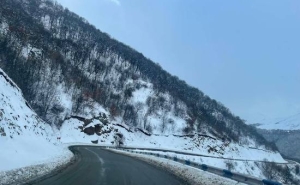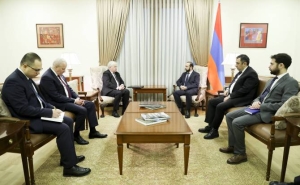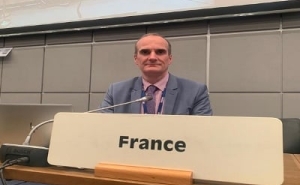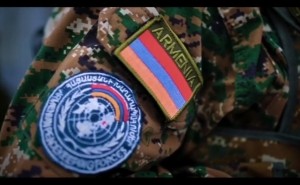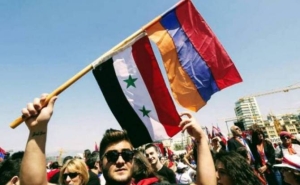 New Accents on the Armenian-Georgian Agenda
New Accents on the Armenian-Georgian Agenda

Georgian Foreign Minister Mikheil Janelidze paid a two-day official visit to Armenia. It is noteworthy that on March 24, the false alarm of a terror attack in Zvartnots airport did not become a reason for postponing Georgian Foreign Minister's visit, and he arrived by car.
Janelidze's visit was of a familiarizing nature. He was appointed to his post after the resignation of former Prime Minister Irakli Garibashvinli in December, during the changes in the Cabinet of Ministers. Since Georgian Dream (2012) has come to power, 4 Foreign Ministers have already changed.
It is also interesting that the Yerevan visit was preceded by Janelidze's visit to Baku, which is symbolizing the principle of balanced development of relations in the region.
Within the visit, Mikheil Janelidze met with President of Armenia Serzh Sargsyan, Prime Minister Hovik Abrahamyan, Foreign Minister Edward Nalbandian and paid tribute to the memory of Armenian Genocide victim’s with a minute of silence. Despite the fact that this is Janelidze's first visit to Armenia as Foreign Minister, he has already met Armenian Foreign Minister Edward Nalbandian in February at a security conference in Munich.
The main topic of discussion in the meetings between the Georgian Foreign Minister and the Armenian senior officials was the implementation of the earlier reached sectoral agreements, such as the development of transport infrastructure, energy, economic, financial, educational cooperation and tourism.
During the discussions, the parties have referred to the conflicts in the South Caucasus. The pro-Azerbaijani position of the Georgian authorities, of course, could not fall out of the attention of Yerevan. The most recent manifestation of this was the "for" voting of Georgian parliamentarians to 2 anti-Armenian resolutions in PACE. Taking into account the importance of this issue, the government most likely has stressed the importance of relative balanced position of Tbilisi in the context of Karabakh conflict. In his statement, after meeting his Georgian counterpart, the RA Foreign Minister Nalbandyan said: "Georgia's support to the [OSCE] Minsk Group, the only format having an international mandate to act as a mediator, is important in the efforts toward reaching an exclusively peaceful solution." The same problem was also raised at a meeting of Serzh Sargsyan and Mikheil Janelidze. Serzh Sargsyan and Mikheil Janelidze also highlighted the policy of balanced approach to sensitive issues of the two countries based on the principle of the respect of mutual interests.
Another important topic were the matters related to bilateral economic cooperation. In this regard the formula of the RA President put into circulation two years ago, according to which "different integration vectors don't hinder the development of bilateral relations, but on the contrary, itcreates more opportunities for each other" has not been put into practice yet.
If the first part of the formula is clearly rooted in the perceptions of authorities of two countries (the high-level statements show this), it seems the sides have not been able to establish mechanisms for cooperation in regard with the second part - "realization of new opportunities". The problem was once again voiced during the Armenian-Georgian discussions. Armenia's Prime Minister and Minister of Foreign Affairs of Georgia stressed that membership in various integration unions of the two countries opens new opportunities for mutually beneficial bilateral and multilateral projects. During the discussions, the parties even stressed the need of activating the works of the Intergovernmental Commission on Economic Cooperation between the Republic of Armenia and Georgia to promote mutual economic cooperation.
The intensification of the works of the Intergovernmental Commission on Economic Cooperation is a fair demand. The last 9th session of the Armenian-Georgian intergovernmental commission on economic cooperation (formed in 1997) was held in 2011, and the 10th Convening was being delayed for unknown reasons. However, various processes both in Armenia and Georgia, as well as the regional processes have created new regional realities and the fact that the Intergovernmental Commission's session hasn't been organized for 5 years can be described as a failure of the parties. Armenian-Georgian relations, seems to be behind the regional developments and it is necessary to fill this gap as soon as possible by organizing the "belated" 10th session of the Intergovernmental Commission on Economic Cooperation.
The third block of thematic discussions during Janelidze's visit was humanitarian-cultural. In this context, the sides paid attention to tourism, preservation of Armenian cultural heritage in Georgia and other issues. It should be noted that this regard has recently activation of cooperation between the Armenian and Georgian sides have been observed, a vivid example of which is the project of reconstructing Saint Gevorg church.
Other materials on this subject
- Giorgi Sharvashidze, former rector of TSU, appointed Ambassador of Georgia to Armenia In 2004-2013, he served as Director of the Academic Support Program at the Open Society Institute in Budapest.
- Ruling party MP found dead at home Relatives have told the media that the 51-year-old lawmaker had suffered health issues since the death of his son in a road accident in 2017.
- Tbilisi Celebrates Traditional "Vardaton" Festival Dedicated to Sayat Nova According to a tradition established over a century ago, Georgian Armenians marched from Hovhannes Tumanyan's house to the Sayat Nova monument, laid roses, and then headed to the Saint Gevorg Church, paying...
- US President Joe Biden Releases Armenian Genocide Remembrance Day Statement As we reflect on the Armenian genocide, we renew our pledge to remain vigilant against the corrosive influence of hate in all its forms.
- 3.0 Magnitude Earthquake Hits Southern Georgia According to the National Seismic Monitoring Center, the tremor was recorded at 10:34 am Tbilisi time. The epicenter was located 55 km away from the capital, 16 km southwest from town Tsalka (Samtskhe-Javakhk...
Other materials on this subject
- Prime Minister of Georgia to visit Armenia Prime Minister Nikol Pashinyan and his Georgian counterpart are scheduled to hold a meeting in Yerevan.
- Georgian Minister Thanks Armenia For Readiness to Assist in Fight Against Forest Fire Of course, we also have mobilized equipment. But you see that we cannot physically use this equipment in large quantities; the terrain is such.
- The RA Minister of Defence Meets with the Prime Minister of Georgia Suren Papikyan visited the Heroes Square in Tbilisi, laid flowers at the monument and paid tribute.
- Georgian Foreign Minister to Visit Armenia During the official visit meetings are also scheduled with Armenia’s President, Prime Minister and Speaker of Parliament", the statement says.
- Statement of the Ministry of Foreign Affairs of Armenia on the 107th Anniversary of the Armenian Genocide The Republic of Armenia is resolutely fighting for the restoration of justice and the rights of the victims, having its significant contribution and leadership in the prevention of crimes against humanity.
-
 17:08
17:08The regular session of the Anti-corruption Policy Council takes place in Jermuk
-
 15:05
15:05The Prime Minister sends congratulatory messages to the supreme leader of Iran and the President of Iran
-
 11:11
11:11Armenia sends earthquake aid to Turkey
-
 10:43
10:43Commemoration of the Pontiff St. Sahak Partev
-
 09:16
09:16Some roads are closed and difficult to pass in Armenia
-
 19:55
19:55Phone conversation of the Foreign Minister of Armenia with the U.S. Assistant Secretary of State for European and Eurasian Affairs
-
 18:30
18:30Prime Minister Pashinyan and President Khachaturyan meet
-
 18:20
18:20Ararat Mirzoyan with Co-Chairman of the OSCE Minsk Group of France Brice Roquefeuil
-
 17:01
17:01Humans could land on Mars within 10 years, Musk predicts
-
 16:45
16:45France, US urge 'immediate' end to Nagorno Karabakh blockade
-
 16:01
16:01Blockaded Nagorno Karabakh launches fundraiser to support quake-hit Syria
-
 15:59
15:59Earthquake death toll in Turkey rises to 18,342
-
 15:43
15:43Ararat Mirzoyan Held a Telephone Conversation with Sergey Lavrov
-
 15:06
15:06French president rules out fighter jet supplies to Ukraine in near future
-
 14:47
14:475 Day Weather Forecast in Armenia
-
 14:44
14:44President Vahagn Khachaturyan wrote a note in the book of condolences opened in the Embassy of Syria in Armenia
-
 14:20
14:20Azerbaijan’s provocations impede establishment of peace and stability – Armenian FM tells Russian Co-Chair of OSCE MG
-
 12:57
12:57France representation to OSCE: Paris calls on Azerbaijan to restore freedom of movement through Lachin corridor
-
 11:40
11:40Command of Kosovo forces highly appreciated preparation of Armenian peacekeepers
-
 10:16
10:16The United States withdrew from sanctions against Syria for six months the provision of assistance after the earthquake
day
week
month
Humidity: %
Wind: km/h


